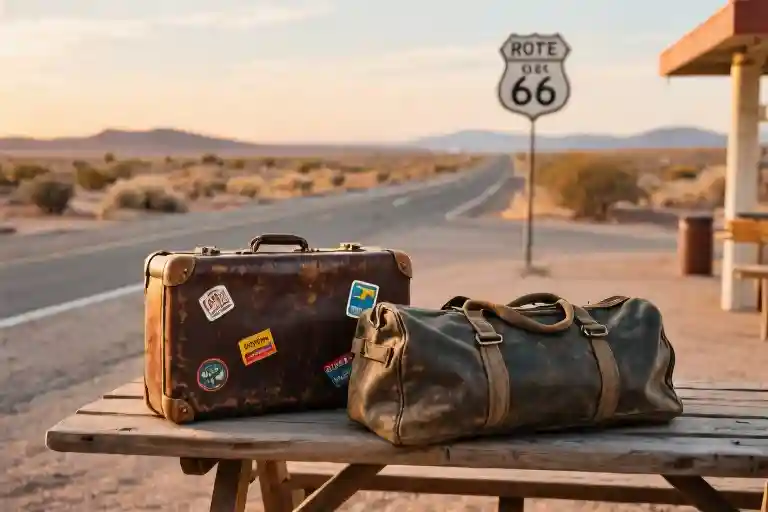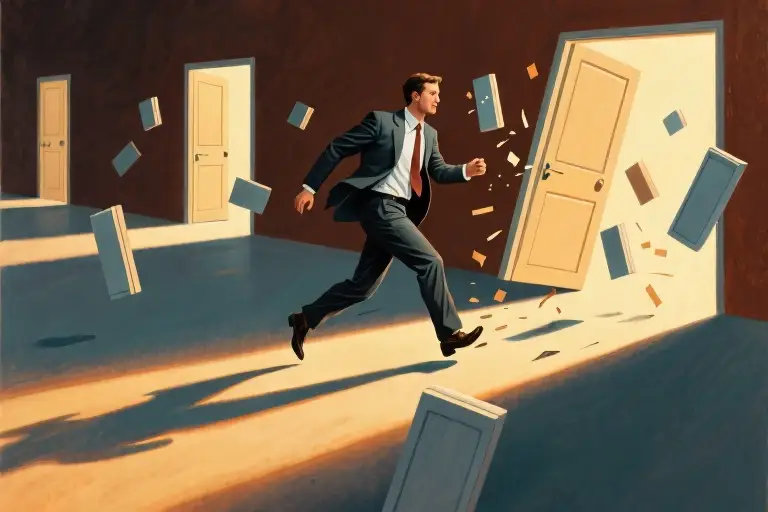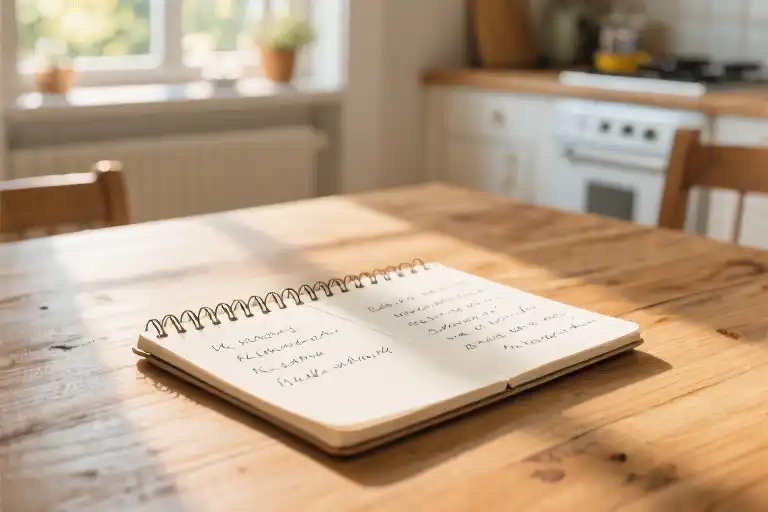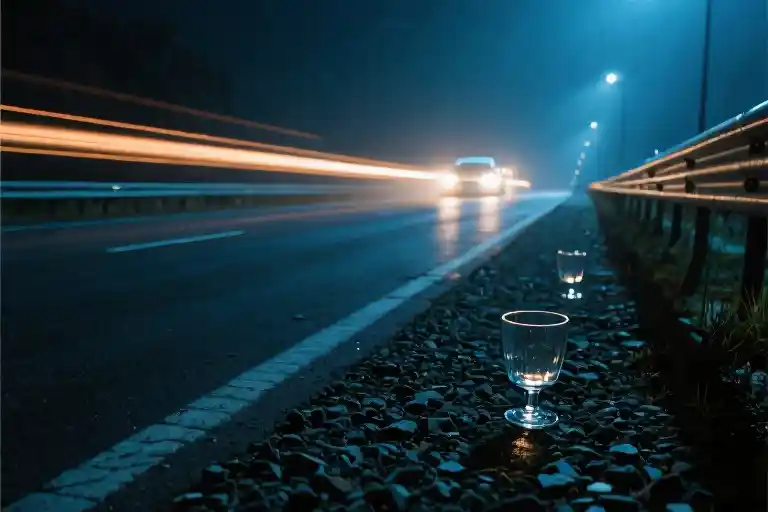“It takes a lot of rehearsing for a man to be himself.” The words glowed on my phone screen as the auctioneer’s assistant placed another cardboard box on the table. My fingers trembled slightly when signing the consignment forms—not from regret, but from the sheer physicality of dismantling a life. That morning I’d torn our family portrait in half, the sound of ripping paper cleaner than I’d anticipated. No allergy meds in the glove compartment this time. No safety net.
Rain tapped against the empty bookshelves in what used to be my Philadelphia row house. The movers had taken everything except three intentional items: grandfather’s pocket watch (still ticking on the mantel), my dog-eared copy of On the Road (pages swollen with humidity), and a folded gas station map from 1993. The watch would go to the pawnshop tomorrow. The book stayed. As for the map…
My thumb traced the brittle paper’s creases where teenage me had marked rest stops with burger joint napkins. Back when $200 and Kerouac’s prose seemed sufficient fuel for crossing a continent. The midwestern wheat fields had other plans—my lungs rebelling against the pollen-thick air until the asthma attack left me wheezing in an Iowa emergency room. That failed geographical escape now smelled like antiseptic and diesel fumes from idling trucks outside the clinic.
Two generations of escape attempts sat side by side on the hardwood floor. The 1993 version: a nylon backpack with tent poles poking out, mix tapes labeled in Sharpie. The 2023 iteration: a wheeled suitcase containing blood pressure meds, noise-canceling headphones, and a single key to a storage unit I’d already prepaid for twelve months. Different equipment for different kinds of freedom.
Through the bay window, the Liberty Bell’s silhouette dissolved into the storm. I zipped the suitcase shut. GPS would replace paper maps this time, but the dashboard screen would remain blank—no destination entered. Somewhere between reinventing yourself and running away exists a highway where your past can’t find you. My fingers closed around the pocket watch’s cold brass. Tick. Tock. The auction starts at nine.
The Serpent’s Ritual
The auction house pen felt heavier than expected when I signed the final lot number. My signature—usually a fluid gesture honed through decades of business meetings—now dragged across the paper like a hesitant snake leaving its first skin behind. Three objects defined this shedding: grandfather’s railroad pocket watch, mother’s Wedgwood tea set, and my own first-edition Kerouac.
Each item carried its own surrender ceremony. The watch’s brass casing still bore teeth marks from when I’d tried opening it as a child. The auctioneer’s assistant handled it with white gloves while I stood bare-handed, feeling the ghost weight of generations slipping away. At the antique dealer’s, the teacups chimed like farewell bells as they were wrapped in tissue—a sound that echoed through my empty apartment later that evening.
It was while packing the last box of books that the map fluttered out, its creases worn translucent from years folded in darkness. The 1993 Rand McNally road atlas fell open to page 43, where someone—likely my teenage self—had circled Iowa in red marker with a shaky exclamation: “Wheat fields or bust!” The brittle paper crackled like old skin as I traced the aborted route from Philadelphia to where my breath had betrayed me.
Rain tapped against the bay windows of my now-echoing living room. Without the grandfather clock’s hourly chime, time expanded strangely. I counted the drops while sorting through what remained: a single suitcase containing two prescription bottles (one for allergies, one for blood pressure), a leather-bound journal, and the car keys that would carry me west—properly this time.
The pocket watch had fetched enough to cover six months’ rent elsewhere. The teacups bought freedom from family tea parties where we’d sip in silence. And Kerouac? That sale purchased the most valuable lesson: romanticism needs budgeting. The buyer never noticed the faded coffee rings on page 56 where Dean Moriarty declares, “The road is life,” nor the tiny tear stains where I’d learned that roads also end.
As I clicked off the apartment lights for the last time, the hardwood floors—stripped of rugs and furniture—gleamed like fresh scales under moonlight. The door locked with a definitive snick, the sound of one skin being fully shed.
Wheat Field Respirator
The water bottle rolled between the brake pedal and clutch as I swerved onto the gravel shoulder, its plastic crinkling in time with my wheezes. Iowa’s golden waves stretched to the horizon – a cruel joke for someone whose lungs treated pollen like invading armies. My 1987 Toyota Tercel smelled of melted crayons and Kerouac’s dog-eared paperback sliding across the dash.
Three days earlier, I’d taped a $200 traveler’s check to page 112 of On the Road where Sal Paradise hits Denver. The check’s perforated edges peeked beneath Dean Moriarty’s manic dialogue, my teenage self believing currency could be absorbed through literary osmosis. By Des Moines, reality arrived with the precision of an asthma attack – first the tightness behind the sternum, then the world narrowing to the diameter of an inhaler mouthpiece.
Emergency room fluorescents revealed the paradox: my body rejected this promised land while craving its symbolism. Through the ambulance bay doors, Peterbilt horns blended with the radio playing Born to Be Wild – Steppenwolf’s anthem warping into a taunt. The nurse’s pen scratched against my discharge papers: ‘Acute allergic rhinitis with asthmatic exacerbation.’ Beneath the clinical language hid the real diagnosis: geographic therapy requires more than a full tank and romantic delusions.
The Greyhound ticket home nestled in Kerouac’s pages like a bookmark at the wrong chapter. Its perforated edge tore cleanly, unlike the ragged separation between who I’d hoped to become and who kept returning to Philadelphia. That ticket stub would later surface in a donated coat pocket, its destination unchanged but its meaning transformed – not surrender, but the first rehearsal for a truer escape.
What the wheat fields taught me emerges now in highway rest stops: freedom isn’t found in landscapes but in carrying fewer illusions. The inhaler stays in my glove compartment these days, less as medical necessity than a relic. When its plastic casing clicks open, I hear not labored breath but eighteen-year-old hubris whispering: Next time, pack antihistamines for your metaphors.
The Dialogue of Two Suitcases
The duffel bag from 1993 smelled of mildew and unwashed socks. Inside: a dog-eared copy of On the Road, $217 in crumpled bills, and a plastic baggie of allergy pills already dissolving in the humidity. The zipper was broken where I’d forced in a second pair of jeans at the last minute. That bag held everything an 18-year-old thought necessary for reinventing himself – except, as Iowa would soon teach me, an understanding of how wheat pollen feels when it invades unprepared lungs.
Now, the leather satchel on the passenger seat contains different talismans. A monthly pill organizer with compartments labeled M/T/W/Th/F/S/Su. The deed to a sold house folded behind my driver’s license. A single key that no longer fits any lock in Philadelphia. At a roadside Shell station outside Columbus, I notice how paying for gas has changed: no more counting out sticky coins from the ashtray, just the impersonal blink of a credit card terminal approving my escape.
Yet when Thunder Road crackles through the rental car’s speakers – same song that played during my asthma attack outside Des Moines – time collapses. The GPS screen flashes ‘Calculating Route’ where a paper map once rustled. This is the peculiar wisdom of midlife adventure: you pack lighter not because you need less, but because you finally know what actually sustains you. The inhaler stays in the glove compartment this time, not as emergency equipment but as a relic to measure progress against.
Kerouac never mentioned how Dean Moriarty might have handled lower back pain during those marathon driving sessions. There’s a Thermos of herbal tea where the whiskey flask used to be, compression socks rolled neatly beside the spare charger. These aren’t concessions to aging so much as hard-won provisions for the long game of self-discovery. The road hasn’t gotten smoother; I’ve learned where to place my weight.
At the next rest stop, I line up both bags on a picnic table – the sagging nylon ghost of my first failure and its leather-bound successor. A trucker walking past nods at the display. ‘Heading somewhere important?’ he asks. The question hangs between us like the last chord of that Springsteen song. Important implies a destination. I’m traveling to find out what happens when you stop running toward or away, and simply move as yourself through the world.
What changes isn’t just the contents of your luggage, but your relationship to the act of packing. Young me stuffed that duffel with symbols of who I might become. Middle-aged me empties pockets full of who I’ve been. Somewhere in Nevada, where the radio signal fades to static, I’ll open both bags and let the desert wind sort through what’s left.
The Alchemy of Rearview Mirrors
The pill organizer sits snug in the cup holder, its seven compartments filled with the chemical balance of middle-aged existence. Through the windshield, Route 66 stretches toward a horizon blurred by heat waves. In the rearview mirror, Philadelphia’s skyline shrinks like a fading bruise – still visible, but no longer painful to look at.
This is the third morning of driving west. My fingers tap along to the same Eagles song that played during my first failed escape in ’93, though now it streams through satellite radio instead of crackling AM frequencies. The GPS screen stays stubbornly blank, its “Enter Destination” prompt unanswered. Somewhere near Flagstaff, I finally understood: this journey wasn’t about arriving, but about the deliberate act of not turning back.
My morning ritual has become strangely sacred: sorting blood pressure medication between sips of gas station coffee, tracing routes on a paper map with one hand while the other adjusts reading glasses. The duffel bag behind me holds practical things – compression socks, a travel CPAP machine, dog-eared copies of Steinbeck instead of Kerouac. At rest stops, I sometimes catch younger travelers eyeing my setup with puzzled amusement. They don’t realize my carefully curated survival kit represents its own kind of rebellion – not against society, but against the expiration date we assign to adventure.
Interstate signs whip past in a rhythmic hypnosis. Each mile marker peels away another layer of who I was expected to be: the dutiful son, the reliable employee, the keeper of family heirlooms. That person still exists in the shrinking reflection behind me, growing smaller but never quite disappearing. Maybe that’s the truth about reinventing yourself – the past never fully detaches, it just becomes light enough to carry.
Somewhere in New Mexico, I pull over to watch the sunset paint the desert in impossible colors. The pill organizer clicks open with familiar precision. As I swallow the evening dose, it occurs to me that freedom and responsibility aren’t opposing forces, but traveling companions taking turns at the wheel. The GPS still blinks its patient question, the road still unspools westward, and for the first time in forty years, I’m comfortable not knowing which exit leads to redemption.
The Fragile Freedom of Shedding Skin
The dashboard glows faintly in the predawn light, its digital display reading 207 miles to next service area. Forty years separate this moment from the asthma attack that sent my first westward escape crumpling like a paper map in an Iowa emergency room. The rental truck’s cab smells of stale coffee and new vinyl, a far cry from the mildew-scented Chevy of my youth. This time there are no dog-eared copies of Kerouac rattling in the glove compartment—just a Ziploc bag of prescription bottles and a single key to a storage unit in Denver.
Geographical escape never works the way we imagine. At eighteen, I believed crossing state lines could scrub away Philadelphia’s soot from my skin. The midwestern wheat fields taught me otherwise; the body remembers what the mind tries to abandon. Now the rearview mirror frames shrinking silhouettes of brick row houses, their identical facades dissolving into the Turnpike’s morning haze. Unlike my teenage self who packed dreams alongside spare underwear, this middle-aged version carries something heavier—the knowledge that reinventing yourself isn’t about distance, but about what you’re willing to leave permanently in the rearview.
A truck stop radio plays the same Eagles song that was popular during my first failed departure. The coincidence makes me laugh—not the bitter chuckle of my younger self, but the warmer sound of someone who’s learned to appreciate life’s stubborn rhymes. Midlife adventure isn’t the reckless lunge we envision at twenty; it’s driving west with both hands on the wheel while your lower back protests, aware the road contains no magic except what you bring to it.
Existential freedom reveals itself in small moments: the satisfying click of donating your father’s golf clubs to Goodwill, the way Colorado license plates start outnumbering Pennsylvania ones. My phone buzzes with a realtor’s update—the closing papers signed remotely, the row house that held three generations of our family now officially someone else’s burden. No safety net means no excuse to turn back when the novelty wears off, when the new skin still feels raw beneath desert sun.
Your third attempt will need more than a full tank of gas, I think as the GPS refreshes its route. The screen blinks cheerfully: No set destination. Unlike eighteen-year-old me who plotted each pit stop, this version understands the destination was never California or even Denver—just the willingness to keep driving when the old skin finally slips away. The most honest answer to that black screen question—What does your third attempt require?—might simply be the courage to watch familiar skyline disappear without reaching for the brakes.





